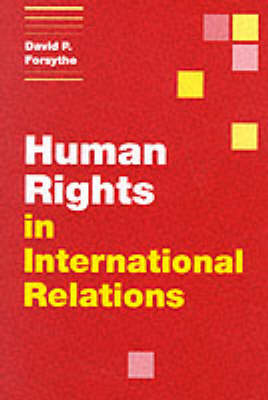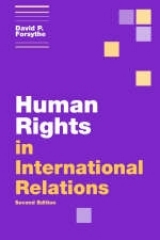
Human Rights in International Relations
Seiten
2000
Cambridge University Press (Verlag)
978-0-521-62999-7 (ISBN)
Cambridge University Press (Verlag)
978-0-521-62999-7 (ISBN)
- Titel erscheint in neuer Auflage
- Artikel merken
Zu diesem Artikel existiert eine Nachauflage
This new textbook provides an introduction to human rights in international relations at the turn of the twenty-first century. The book examines the policy-making process that establishes and tries to apply human rights norms, documents the many changes in international human rights during the past half-century, and considers the future of universal human rights.
This new textbook provides an introduction to human rights in international relations at the turn of the twenty-first century. The book examines the policy-making process that establishes and tries to apply human rights norms through the United Nations, regional organizations, state foreign policy, human rights groups, and transnational corporations. Four themes permeate the book: that human rights are here to stay in international relations, that state sovereignty is being transformed by the human rights discourse, that the 'soft' law of diplomacy is as important as the 'hard' law of court judgments, and that private actors are highly important in international human rights developments. The book documents the many changes in international human rights during the past half-century, and considers the future of universal human rights. Containing chapter-by-chapter guides to further reading and discussion questions, this book will be of interest to all undergraduate and graduate students of human rights, and their teachers.
This new textbook provides an introduction to human rights in international relations at the turn of the twenty-first century. The book examines the policy-making process that establishes and tries to apply human rights norms through the United Nations, regional organizations, state foreign policy, human rights groups, and transnational corporations. Four themes permeate the book: that human rights are here to stay in international relations, that state sovereignty is being transformed by the human rights discourse, that the 'soft' law of diplomacy is as important as the 'hard' law of court judgments, and that private actors are highly important in international human rights developments. The book documents the many changes in international human rights during the past half-century, and considers the future of universal human rights. Containing chapter-by-chapter guides to further reading and discussion questions, this book will be of interest to all undergraduate and graduate students of human rights, and their teachers.
Part I. The Foundations: 1. Introduction: human rights in international relations; 2. Establishing human rights standards; Part II. Implementing Human Rights Standards: 3. Global application of human rights norms; 4. International criminal courts; 5. Regional application of human rights norms; 6. Human rights and foreign policy in comparative perspective; 7. Non-governmental organizations and human rights; 8. Transnational corporations and human rights; Part III. Conclusion: 9. The politics of liberalism in a realist world.
| Erscheint lt. Verlag | 27.4.2000 |
|---|---|
| Reihe/Serie | Themes in International Relations |
| Zusatzinfo | 2 Tables, unspecified |
| Verlagsort | Cambridge |
| Sprache | englisch |
| Maße | 154 x 228 mm |
| Gewicht | 450 g |
| Themenwelt | Recht / Steuern ► EU / Internationales Recht |
| Recht / Steuern ► Öffentliches Recht ► Völkerrecht | |
| Sozialwissenschaften ► Politik / Verwaltung ► Europäische / Internationale Politik | |
| ISBN-10 | 0-521-62999-3 / 0521629993 |
| ISBN-13 | 978-0-521-62999-7 / 9780521629997 |
| Zustand | Neuware |
| Haben Sie eine Frage zum Produkt? |
Mehr entdecken
aus dem Bereich
aus dem Bereich



